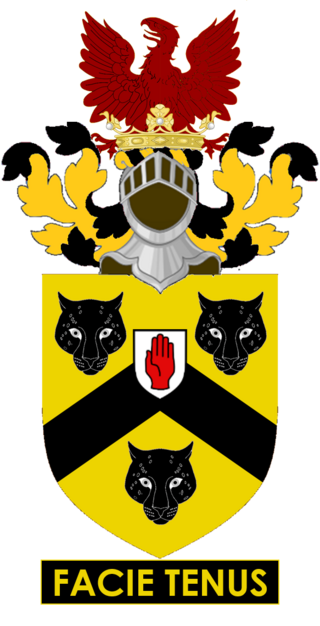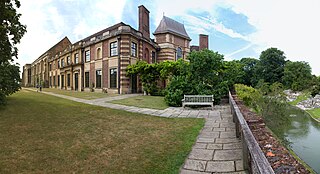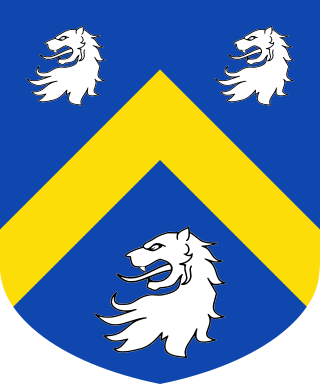Related Research Articles

Sir Edward Montagu of Boughton, Hanging Houghton and Hemington in Northamptonshire was an English lawyer and judge in the time of Henry VIII and Edward VI. He was Chief Justice of the King's Bench from 1539 to 1545 and Chief Justice of the Common Pleas from 1545 to 1553.
Robert Montagu, 3rd Earl of Manchester JP was an English courtier and politician who sat in the House of Commons from 1660 to 1671 when he inherited the peerage as Earl of Manchester.
Sir John Temple was an Irish politician, Speaker of the Irish House of Commons and Attorney General for Ireland. He was the great-great-grandfather of the distinguished statesman Henry John Temple, 3rd Viscount Palmerston. His descendants in the female line include the famous poet Lord Byron.

The Hales Baronetcy, is a title in the Baronetage of England. There were three Hales baronetcies. The oldest was created in 1611 for Edward Hales. He was a member of a Kent family. The second was created in 1660 for Robert Hales, MP for Hythe 1659, also of a Kent family. The third was created in 1660 for John Hales of Coventry, co. Warwick.

Sir Richard Rainsford SL (1605–1680) was an English judge and politician who sat in the House of Commons between 1660 and 1663. He became Chief Justice of the King's Bench.
Sir William Courten or Curteen (1572–1636) was a wealthy 17th century merchant, operating from London. He financed the colonisation of Barbados, but lost his investment and interest in the islands to the Earl of Carlisle.

There have been two baronetcies created for persons with the surname Wheler, one in the Baronetage of England and one in the Baronetage of the United Kingdom. One creation is extant as of 2008.

Sir Job Charlton, 1st Baronet KS was an English judge and politician who sat in the House of Commons between 1659 and 1679. He was Speaker of the House of Commons of England briefly in 1673.

Sir Justinian Isham, 2nd Baronet was an English scholar and royalist politician. He was also a Member of Parliament and an early member of the Royal Society.
Sir Edward Seymour, of Berry Pomeroy, 5th Baronet of Bradley House, Maiden Bradley, Wiltshire was an English landowner and Tory politician.

Sir Robert Throckmorton, KG, of Coughton Court in Warwickshire, was a Member of Parliament and a distinguished English courtier. His public career was impeded by remaining a Roman Catholic.
Sir Robert Bernard, 1st Baronet (1601–1666) was an English lawyer and politician who sat in the House of Commons in 1640.

Sir Robert Barnham, 1st Baronet of Boughton Monchelsea Place was an English politician who sat in the House of Commons from 1660 to 1679.
Sir John Norwich, 1st Baronet was an English politician who sat in the House of Commons at times between 1654 and 1660.
Sir Samuel Jones was an English politician who sat in the House of Commons in 1656 and 1660. Although a parliamentarian in the English Civil War he later became a strong Royalist.
Sir Matthew Dudley, 2nd Baronet was an English politician.
Sir Edward Littleton of Pillaton Hall, 2nd Baronet, was a Staffordshire landowner and MP from the extended Littleton/Lyttelton family, who represented Staffordshire in the Cavalier Parliament.

Sir John Shaw, 1st Baronet of Eltham Lodge, Kent was an English merchant and politician who sat in the House of Commons from 1661 to 1679.

Agnes Hotot was an English noblewoman known for besting a man in a lance fight. According to Arthur Collins, writing in 1741, an unspecified monk recorded that Hotot took her father's place in a duel after he fell ill, disguising herself as a man, and only revealed her true identity after knocking her opponent off his horse. When Hotot later married into the Dudley family of Clapton, Northamptonshire, the Dudleys commemorated her exploits with a new crest depicting a woman wearing a war helmet.

The Dudley baronetcy, of Clopton in the County of Northampton, was created in the Baronetage of England on 1 August 1660 for William Dudley. He was High Sheriff of Northamptonshire that year, and was briefly Member of Parliament for Northampton in 1663. The 2nd Baronet represented both Northampton and Huntingdonshire in Parliament.